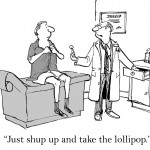Like an anthem, a holy grail, the word appears in every journal, every proposal and every health strategic plan. “Quality.” We say, read and hear it so often we are developing “quality fatigue.” Like “iterative” hackneyed phrases such as “out-of-the-box”, “deep-dive” and perhaps even “Personalized Medicine,” quality has begun to feel like water-torture and risks being deprived of flavor or meaning. However, do not so fooled or bludgeoned that you lose focus. Quality is another word for absolute control and power.
For too long quality meant, “work hard, do a good job, care about the patient.” Every provider was a “quality provider.” Have you ever met a doctor who did not believe they practiced “high quality” medicine?
Quality was measured at the front end by basic research, whether a medicine or therapy might improve human life, and on the back end by the marketplace. If patients and doctors liked an idea, it would flourish. If not, then it would gradually fade away. In between the only enforcement of quality was the individual motivation, experience and judgment of physicians, the “art” of medicine, the occasional headline grabbing disaster, and coarse insurance oversight and denial; all nailed together by the gavel of medical-legal confrontation.
Today quality means is data. Big data. Giant data. The ability to monitor, measure and modify, in real time, the impact of every medical event and intervention. Not the average hospital length-of-stay last year, but the specific moment by moment actions which delay the discharge of a specific patient or patient type, today. Not how many vaccines are distributed, but to whom, with what result and, most importantly, who is not vaccinated and why?
Does a therapy work to save lives in the real world, and at what cost? Is compliance an issue? What known and unknown complications are occurring and what is their root cause. Which clinicians need new training? How fast does a critical advance get to the bedside and are physicians incorporating the technology; what is the net effect? Big quality uses the entire healthcare system as a laboratory and all of us, all our patients, every community, are subjects and benefactors of the grand experiment.
Quality will control the future of healthcare. Those individuals or institutions that wait to get their “quality metric” report back from their local friendly insurance carrier or from CMS, who rely on billing data to measure outcomes, or patient satisfaction surveys as a final measure of “how well we are doing,” are doomed.
Investing in a “culture of quality,” means not just “doing our best,” but fully investing in the analysis and improvement of every step, from the moment a person rolls out of bed, turns on their smart-phone, parks in the lot, walks into the office, uses a surgicenter, enters a hospital, purchases at a pharmacy, gets rehab, is admitted to a nursing facility or spends their last day in hospice. Those institutions that understand and optimize total quality will dictate tomorrow.
Quality; hard clear defined big data, is power. Doctors must seize the quality mantra and use it to design, direct and define the practice of medicine and the future health of populations. Only when we have achieved that goal, can we say we are tired of the word and rest.







3 Comments